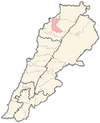Samir Frangieh

Samir Frangieh | |
|---|---|
 Frangieh in 2012 | |
| Born | Samir Hamid Frangieh 4 December 1945 |
| Died | 11 April 2017 (aged 71) Beirut, Lebanon |
| Nationality | Lebanese |
| Occupations |
|
| Known for | 14 March alliance |
| Spouse | Anne Mourani |
| Children | 2 |
Samir Frangieh (4 December 1945 – 11 April 2017) was a Lebanese politician, member of the Lebanese Parliament and a leftist intellectual. He was from the Frangieh family, one of the well-known political families of Lebanon.
Early life
[edit]Frangieh was born in Zgharta on 4 December 1945.[1] He hailed from an old political family, Frangieh family.[2] He is the son of Hamid Kabalan Frangieh and Lamia Michel (née Raffoul).[3] Hamid Frangieh was a lawyer and a businessman.[4] He was the elder brother of Suleiman Frangieh who was the President of Lebanon in the period 1970-1976.[2] Therefore, Tony Frangieh and Samir Frangieh were cousins.[5]
Career, activities and views
[edit]Frangieh was a leading journalist.[6] He contributed to many leading publications, including L'Orient (1970), L'Orient-Le Jour (1971–1975), Le Monde diplomatique, Libération, An Nahar, As Safir and Financial Times.[1] He also published articles in academic journals such as Journal of Palestine Studies.[7][8]
Frangieh joined the Lebanese Communist Party and left it in 1967.[1] He was the founder of the Lebanese Communist Union which was disestablished in 1970.[1] He was also a member of the National Movement Center.[1] During the term of President Émile Lahoud, Frangieh was one of the opposition leaders, who tried to challenge close allies of the president.[9] The opposition group was also led by Rafik Hariri and Walid Jumblatt.[9] Frangieh was a political ally of Jumblatt.[10]
Frangieh was also one of the founders of the Qornet Shehwan Gathering.[11] He supported the implementation of the Taif accords and the withdrawal of Syrian troops from Lebanon.[12] In addition, he was part of the 14 March Alliance[13] and a member of its general secretariat.[14][15] He was the author of "Beirut manifesto" that was published in Le Monde on 22 June 2004.[16] The manifesto, which was signed by Lebanese intellectuals and eminent public figures, challenged the dominance of Syria in Lebanon.[16]
In the 2005 general elections, Frangieh became a member of the Lebanese Parliament, representing Zgharta.[17] However, in the general elections of 2009, Frangieh was not included in the election list of the March 14 alliance.[18]
Frangieh was elected president of the March 14 national council in June 2015 against Fawzi Ferri.[19]
Personal life and death
[edit]Frangieh was married to Anne Mourani with whom he had two children.[1] He was the author of The Journey to the Extreme of Violence that was published in 2011.[13] He died on 11 April 2017 in Beirut's Hotel Dieu Hospital.[20][21]
References
[edit]- ^ a b c d e f Who's Who in Lebanon (19th ed.). Beirut: Publitec Publications. 2007. p. 132. doi:10.1515/9783110945904.476. ISBN 978-3-598-07734-0.
- ^ a b Elie Hajj (13 March 2013). "New March 14 Group to Launch in Lebanon Next Week". Al Monitor. Retrieved 14 March 2013.
- ^ "General Election 2005: (14)". Zgharta. 14 June 2005. Retrieved 14 March 2013.
- ^ Najla W. Atiyah (1968). The Role of Leadership in Developing a Political Community in Lebanon 1943-1952 (MA thesis). American University of Beirut. p. 57. hdl:10938/1402. ISBN 9781085682435. ProQuest 2305192361.
- ^ Megan K. Stack (19 April 2005). "Lebanon, a House Divided". Los Angeles Times. Retrieved 14 April 2013.
- ^ Gary C. Gambill (Spring 2001). "Is Syria Losing Control of Lebanon?". Middle East Quarterly. 8 (2): 41–49.
- ^ Nathan Eddington McCormack (2012). The sociopolitical foundations of Palestinian Resistance, 1948-1970 (MA thesis). University of Texas at Austin. p. 1.
- ^ Joe Stork; et al. (Summer 1972). "How American Radicals See The Resistance Dilemma". Journal of Palestine Studies. 1 (4): 4. doi:10.2307/2535661. JSTOR 2535661.
- ^ a b Charles Glass (4 August 2005). "An Assassin's Land". London Review of Books. 27 (15).
- ^ Charles Glass (1 March 2007). "The lord of no man's land: A guided tour through Lebanon's ceaseless war". Harper's Magazine. Retrieved 29 October 2022.
- ^ "Qornet Shehwan Gathering" (PDF). Middle East Mirror. Archived from the original (PDF) on 5 October 2012. Retrieved 14 April 2013.
- ^ Martha Neff Kessler; George Emile Irani; Peter Gubser; Augustus Richard Norton (2001). "Lebanon and Syria: Internal and Regional Dimensions". Middle East Policy. 8 (3): 6. doi:10.1111/1475-4967.00024.
- ^ a b "Samir Frangieh: The Orthodox Law insults the dignity of Lebanese Citizens". iloubnan. Beirut. 3 February 2013. Archived from the original on 12 April 2017. Retrieved 14 March 2013.
- ^ "Lebanon". Coincilation Resources. Archived from the original on 16 April 2018. Retrieved 14 March 2013.
- ^ "March 14 warn of bids to link national security to Syria". Lebanon News. 1 April 2012. Retrieved 14 April 2013.
- ^ a b Dominique Avon; Anaïs-Trissa Khatchadourian; Jane Marie Todd (2012). Hezbollah: A History of the "Party of God". Cambridge: Harvard University Press. p. 200. ISBN 978-0-674-06752-3.
- ^ "Talking To: Samir Franjieh". Now Lebanon. 1 October 2008. Archived from the original on 13 April 2017. Retrieved 14 March 2013.
- ^ Robert G. Rabii (6 June 2009). "Lebanon at the crossroads". Lebanonwire. Archived from the original on 23 March 2013. Retrieved 24 March 2013.
- ^ "Samir Frangieh elected as president of March 14 national council". National News Agency Lebanon. 28 June 2015. Retrieved 17 January 2024.
- ^ "Samir Frangieh passes away at 71". National News Agency Lebanon. 11 April 2017. Retrieved 17 January 2024.
- ^ "Former MP Frangieh dies at 72". The Daily Star. Beirut. 11 April 2017. Archived from the original on 1 May 2021. Retrieved 11 April 2017.
External links
[edit] Media related to Samir Frangié at Wikimedia Commons
Media related to Samir Frangié at Wikimedia Commons
